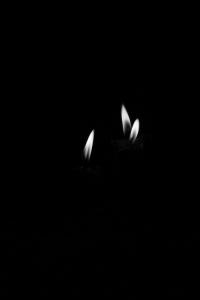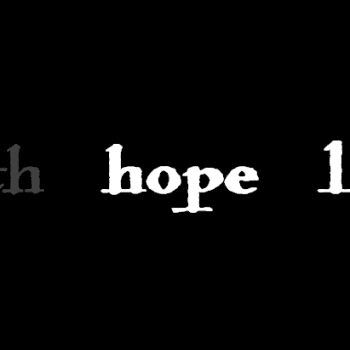When I was nineteen, I returned from a summer of working on an organic wheat farm in Kansas, to find that my parents had been ejected from the community where we’d lived for nine years, and taken up residence in a trailer on a compound where a shifty-eyed man was claiming to see apparitions of the Virgin Mary. I stayed with them for two weeks while deciding to return to a university which had not been especially intellectually or spiritually interesting, although I’d made good friends there.
The compound was muddy because of a supposed “blessed spring” with healing powers, that seemed to trickle all over the place and yet heal no one. Sometimes large groups of credulous women would gather in the field above the trailer, praying rosaries, convincing themselves that the flat pale disk of an Ohio August sun was spinning. The trees around the trailer smelled of sassafras, which was appealing, though nothing else was. The shifty eyed man appeared to have at least two wives, and his locutions of Mary were largely ungrammatical. My parents, by far the smartest people there, worked hard all day, mostly thanklessly, as far as I could tell. Just like in the other place.
I could be misremembering some of this. It was all a little unreal, hazy.
The realest thing for me during that two weeks was the world I found within books. But since the trailer had no electricity, after sunset I could read only by candlelight. This may sound romantic. Candlelight is associated with romance, after all, and “reading by candlelight” has such a pretty ring to it. Abe Lincoln in his log cabin and all that. But the reality was that it was frustrating. I couldn’t recline comfortably, but had to huddle close to the candle, which of course attracted mosquitoes and moths, some of which dutifully burned themselves in the flame.
When you rely on a single flame for even the slightest flicker of light, your relationship with the light changes. It’s no longer a limitless resource, but a precious commodity, and its very scarcity can provoke rage. I was angry at the candle sometimes, because it gave so much less light than I wanted.
Here in the season of darkness as we light the Advent candles, the light is ceremonious, not really needed. We turn out all the electric lights to capture that feeling of mystery, but then switch them on again when there’s work to do.
This is also the season, for the Jewish people, of our own festival of lights, which just accidentally coincides with the Christian season of advent. When we light the Chanukah lights, we commemorate the miracle of the oil that didn’t run out. It was during the Maccabean Rebellion against the Seleucid Empire. The emperor Antiochus had purposefully defiled the temple, slaughtering pigs on its altar, so when the rebels reclaimed their sacred space, it had to be purified and rededicated. But there was almost no oil left to light the sacred lamps that were supposed to be kept burning night and day. They used the little that they had, and sent a runner for more, and miraculously the oil, enough only for one day, lasted eight days and nights, as long as it took for the runner to return with more.
That’s why we eat fried food, usually latkes for those of Ashkenazi Jewish descent, but for the Sephardic Jews, doughnuts. Some also eat dairy products, to remember the cheese that Judith fed to Holofernes, before she got him drunk and cut off his head.
The lighting of the candle is a symbol of reclaiming one’s spiritual home, after exile. The story of the Jewish people is a story of so many exiles, and our psalms speak of a longing for home, for Jerusalem – but not simply geographical Jerusalem, a territory to be claimed and bounded. The imperialist idea that the Holy City could be seized by force for the chosen people is horrifying, because the Jerusalem we long for is always a place of peace, where the lion lies down by the lamb.
That’s the home we long for, the home we seek to build as we light that first candle in the darkness.
And that’s what Advent is about, too: waiting for the coming of the Prince of Peace.
But Chanukah begins with that sense of absolute darkness and emptiness. There isn’t enough oil. Not enough light, or maybe only enough to kill a poor moth or two. We are exhausted at year’s end, exhausted like a jar of oil that’s been dipped into, poured from, so nothing remains, only a few drops. Why bother with the flickering light or the empty pitcher? Why not just snuff out the candle, throw down the pitcher and let it shatter? As women especially, the ones who are supposed to be patient and kind, bounteous, never running out, we’re left just shattered earthenware, oil-soaked, ground into the dirt. Into the mud where there was supposed to be a healing spring, but no matter how much you smear it across your skin you stay old, sick, tired. Your flesh sagging. Old scars like knitted yarn across the skin.
Tomorrow night we will light a second candle, though. We will pray the prayer over the Menorah:
Ba-ruch A-tah Ado-nai E-lo-he-nu Me-lech ha-olam a-sher ki-de-sha-nu be-mitz-vo-tav ve-tzi-va-nu le-had-lik ner Cha-nu-kah.
(Blessed are You, Lord our G‑d, King of the universe, who has sanctified us with His commandments, and commanded us to kindle the Chanukah light.)
Then all together we sing the song:
on this night,
let us light,
two little candles fire.
Tis a sight,
oh so bright.
Two little candles fire.
Two candles. A little more light than the first. A little more light each day.
Rebecca Bratten Weiss is a writer and eco-grower residing in eastern Ohio, but often pretends to be in other places. She has co-authored two novels, as well as poems and essays in a variety of publications, and edits the arts journal Convivium, as well as teaching online for the Convivium School.
“Approaching Mystery” is a regular feature on Sick Pilgrim curated by Joanna Penn Cooper in which we post vignettes that dwell on the mystery of the everyday, that hang in an unresolved (and unresolvable) space of wonder and unknowability.
Read more at http://www.patheos.com/blogs/sickpilgrim/2017/10/approaching-mystery-rebecca-bratten-weiss-keeps-dying/#uSAmEWhufXXJu8JL.99













